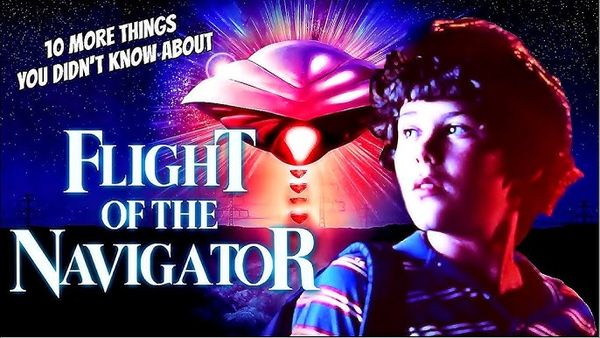Flight of the Navigator (1986)

Flight of the Navigator (1986)
“Flight of the Navigator” is a 1986 science fiction adventure film directed by Randal Kleiser. The film stars Joey Cramer as David Freeman, a 12-year-old boy who experiences a bizarre and extraordinary adventure.
The story begins in 1978, when David goes out into the woods to fetch his younger brother, Jeff. During his journey, David falls into a ravine and is knocked unconscious. When he wakes up and returns home, he finds that everything has changed: eight years have passed, and it is now 1986.
David’s family, who thought he had disappeared, is shocked and overjoyed to see him. However, David has not aged at all, and he has no memory of what happened during the missing years. Doctors and scientists are baffled by his condition and decide to investigate further.
At a NASA research facility, scientists discover that David’s brain contains star charts and information about a distant planet called Phaelon. They also find a spaceship that has crashed nearby, which they believe is connected to David’s disappearance. The spaceship is a sleek, silver craft that seems to be alive.
David hears a telepathic call from the spaceship and decides to sneak into the facility to investigate. Inside the spaceship, he meets Max, a wisecracking artificial intelligence voiced by Paul Reubens. Max explains that he is a Trimaxion Drone Ship from Phaelon, and that David was taken aboard the ship in 1978 to be studied.
Max accidentally traveled at light speed, causing time dilation and resulting in the eight-year gap. With Max’s help, David embarks on a thrilling journey across the United States to return to his own time. Along the way, they evade NASA and the military, who are determined to capture the spaceship.
As they travel together, David and Max form a strong bond. David learns how to pilot the spaceship and experiences various adventures, including a memorable flight over Tokyo and a close encounter with a police helicopter. Max, in turn, learns about human emotions and the importance of friendship.
The film features groundbreaking special effects for its time, particularly in the depiction of the spaceship’s fluid, transforming interior. The combination of live-action and CGI creates a believable and immersive experience for the audience.
“Flight of the Navigator” also explores themes of family, friendship, and the passage of time. David’s struggle to adjust to a world that has moved on without him adds an emotional depth to the story. The film’s soundtrack, composed by Alan Silvestri, enhances the sense of wonder and adventure.
In the end, David and Max decide that the only way to set things right is for David to return to 1978. They manage to travel back in time, and David wakes up in the ravine where he fell, with no memory of the adventure. However, he retains a sense of wonder and curiosity about the universe.
David reunites with his family, and this time, he embraces his brother Jeff, knowing how much he missed him during the eight years. The film concludes with a heartwarming scene of the reunited family watching fireworks together, symbolizing a new beginning.
“Flight of the Navigator” remains a beloved classic, appreciated for its imaginative story, charming characters, and innovative special effects. It continues to capture the hearts of viewers, young and old, with its timeless tale of adventure and friendship.











